A Well Thought Out Scream By James Riordan: U.S. Committee Chooses Boston for 2024 Olympics
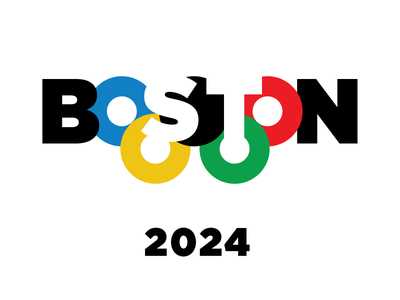
The U.S. Olympic Committee has chosen Boston to bid for the 2024 Games in an attempt to bring the Summer Olympics to America after a 28-year gap. The final four cities under consideration were Los Angeles, San Francisco, Washington and Boston, all of which lobbied hard to become the American choice for more than a year.
“We’re excited about submitting a bid for the 2024 Games and feel we have an incredibly strong partner in Boston that will work with us to present a compelling bid,” USOC chairman Larry Probst said in a news release. “We’re grateful to the leaders in each of the four cities for their partnership and interest in hosting the most exciting sports competition on earth. The deliberative and collaborative process that we put in place for selecting a city has resulted in a strong U.S. bid that can truly serve the athletes and the Olympic and Paralympic movements.”
The Boston 2024 Partnership is a privately backed bid to bring the 2024 Summer Olympics to the city. The city’s official proposal had been submitted on December 1, 2014. The International Olympic Committee (IOC) will select the host city in 2017. Of the final four cities under consideration, Boston was the only first-time bidder in the group.
Chaired by John Fish, CEO of Suffolk Construction Company, the Boston 2024 Partnership is the private group behind Boston’s bid for the 2024 Summer Olympics. Its membership includes Dan O’Connell, chief executive of the Massachusetts Competitive Partnership; Erin Murphy Rafferty, a former Greater Boston Chamber of Commerce vice president; and Emiley Lockhart as general counsel. The group is advised by area leaders including New England Patriots owner Bob Kraft, former US Senator Mo Cowan, and university heads from Harvard, Bentley, and MIT. The Boston 2024 Partnership is paying $124,000 in monthly consulting costs to promote their proposal to the public and demonstrate their commitment to keeping costs in check.
The day after Boston was revealed by the USOC as the winning US city for the bid, partnership chairman John Fish recused himself and Suffolk Construction Company from any Olympic-related bidding.
As of January 2015, former MassDOT Secretary Richard A. Davey is in charge of the Boston Olympics advocacy effort. Political leaders in the area—including Boston Mayor Martin J. Walsh and former Massachusetts Gover-nor Deval Patrick—have commented positively on the prospect of an Olympic event in Boston, while noting hurdles of financing and community support.
Even so, polls conducted in early 2015 indicate declining support in the Boston area for hosting the Olympics. The Boston 2024 Olympic bid has attracted criticism, particularly from a group called No Boston Olympics. Arguments against the bid include: a pattern of overspending in previous Olympics, years of construction, the absence of community meetings, few proven economic benefits for host cities and their tourism industries, and conflicts of interest with Boston promoters who stand to benefit from the Olympics. A March 2015 poll indicated that a 52% majority of Boston area residents are opposed to hosting the Olympic games in 2024. The same poll showed only 36% in favor, one of the lowest levels of support ever registered in a potential Olympic city.
Acknowledging the overspending at past Olympics like Beijing and Sochi, the Boston 2024 Partnership is planning a cost-effective event, using private funds, existing facilities and temporary venues, and transportation projects that have previously received approval. As of June 2014, the group had privately raised $11 million, and another $50 million in private funds will be raised for the global bid campaign.
In response to critics, the Boston 2024 Partnership has encouraged area residents to see the 2024 Olympic bid as a conversation about the region’s future. In an interview with the Boston Business Journal in June 2014, Fish stated the Partnership’s commitment to studying the feasibility of bringing the Olympics to Boston.
According to the Boston 2024 Partnership, planning for and running the Olympics will cost $4.5 billion. In addition, the state of Massachusetts would be required to spend $6 billion on accelerated transportation infrastructure improve-ments. Revenues from TV rights, sponsorships, ticket sales, and merchandise would help with some of the costs, and federal money would be expected to cover security.
The bid leans on the use of existing facilities at Boston-area universities as well as venues like Gillette Stadium and the TD Garden. The Merrimack River in Lowell was selected for rowing events over the Charles River because it has fewer bridges and is longer and wider. Still, before Boston could host the Olympic Games, several facilities would have to be built: a temporary stadium to seat 60,000 people, an Olympic village that spans 100 acres, a velodrome, and an aquatics center.
The Boston bid also relies on several transportation system improvements, most already approved by the state legislature but not yet fully funded. These include: 1) Expansion of South Station, adding six or seven new platforms on land freed up by relocating the adjacent Post Office facility, 2) a new West Station on the Framingham Worcester commuter rail line to be constructed on the Beacon Park Yard property, coordinated with reconfiguration of the Massachusetts Turnpike Allston toll barrier plaza, 3) Pedestrian improvements at the JFK/UMass Red Line station, 4) Purchase of diesel multiple unit (DMU) rail cars for the proposed Indigo Lines, which would shuttle visitors from hotels in Back Bay to the Boston Convention Center venue and a bicycle path between the Olympic Stadium and the Olympic Village.


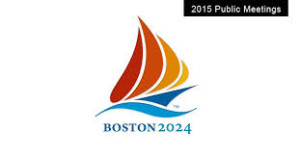
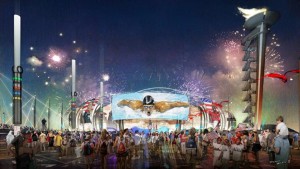
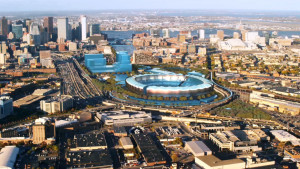
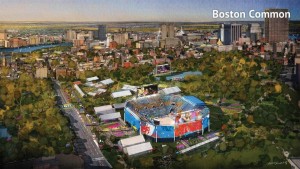
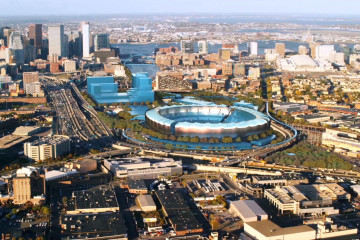

No Comment